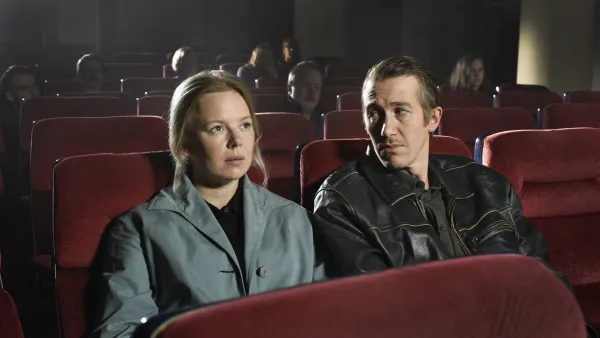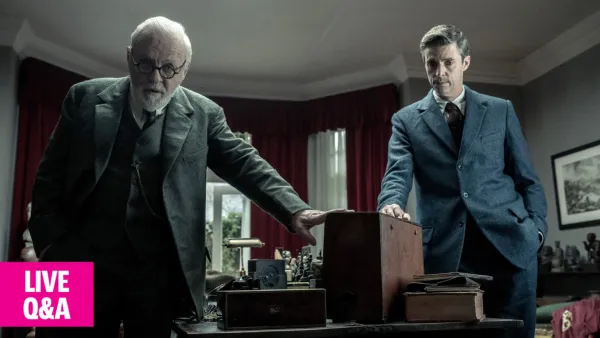Stylistically, Finnish writer/director Aki Kaurismäki’s Fallen Leaves is set in the same social milieu as Italian Neo-Realist films, the working class. But while its proletarian protagonists are similar in class to, say, Vittorio De Sica’s 1948 drama Bicycle Thieves, Fallen Leaves is a romantic comedy. Blue collar boy meets girl on the wrong side of the tracks in Helsinki. Ansa (Alma Pöysti) and the hard drinking Holappa (Jussi Vatanen) are lonely thirty-somethings, searching for love and intimacy in this movie full of dry wit that’s likely to cause viewers to smile often, and perhaps laugh out loud a few times.
Movie buffs will enjoy the many sly cinematic references, from Robert Bresson and Jean-Luc Godard to zombie flicks. Listen closely during the final shot, as the characters walk off into the distance and Ansa reveals the name of the stray mutt she has befriended in order to give it a home (and stave off loneliness). Fallen Leaves’ dialogue is often spare, but there are references to the war between Finland’s neighbor, Russia, and Ukraine, which revolts Ansa. Aside from Ukrainian films, these are the first mentions this reviewer has heard in a feature to that tragic conflagration, and might be considered propaganda, as Finland abandons its neutral stance and joins the ever-expanding NATO alliance.
Like AFI FEST’s standout movie, Memory, Fallen Leaves deals with the impact of alcoholism and the search for meaningful connection between two lonely souls. Will Holappa play spin the bottle instead of hit the bottle, and find true love with Ansa in this charming, disarming 81-minute movie in Finnish, with English subtitles? Stay tuned.
FREUD’S LAST SESSION: THE DOCTOR WILL SEE YOU NOW
Co-writer/director Matthew Brown’s extremely cerebral Freud’s Last Session is reminiscent of Kemp Powers’ play One Night in Miami and its subsequent screen version, in that both conjure up a tête-à-tête between titans. The big difference between the two being that on the evening Cassius Clay won the world heavyweight boxing championship, he really did meet with Malcolm X, Sam Cooke and Jim Brown, whereas the colloquy between Sigmund Freud (Anthony Hopkins) and the novelist C.S. Lewis (Matthew Goode) may or may not have happened. (A title at the film’s finale states that while Freud did indeed meet with an Oxford don towards the end of his life, there’s no proof that that academic was Lewis.) So, this intellectual romp, based on Mark St. Germain’s 2009 play of the same name, is (unlike Miami) based on pure conjecture, which undercuts its veracity for me.
The main source of contention between Freud and Lewis when they meet in London (after Freud has fled the Nazis, leaving Austria behind) as the Battle of Britain rages, is that the former is an atheist, while the latter is a devout Christian. An important subplot involves the relationship between Freud and his daughter Anna (Liv Lisa Fries), and whether or not the founder of psychoanalysis will accept that his daughter is a lesbian and embrace her same sex romance, so Session has a strong LGBTQ theme.
Film fans will no doubt find it delicious that 30 years ago, in filmic turn-about-fair-play, the estimable Hopkins actually portrayed C.S. Lewis in Shadowlands, which was directed by Richard Attenborough and shot on location at Oxford. There have also been a number of movies that depict Sigmund, including John Huston’s 1962 Freud, starring Montgomery Clift; David Cronenberg’s stunning 2011 A Dangerous Method, starring Viggo Mortensen; and – for my money, the best screen portrayal of the Viennese psychoanalyst – Alan Arkin in Herbert Ross’ 1976 The Seven Per-Cent Solution.
The best thing about Brown’s film is that it often unspools with a dreamlike quality, which is highly appropriate for a kind of biopic about the author of the groundbreaking The Interpretation of Dreams. Those interested in the ideas of Freud and Lewis, in psychoanalysis and theology, as well as in gay subject matter, will likely be absorbed and captivated by this clash between two great minds, as I was. Lord of the Rings fans, too, may be interested in Session as Lewis’ fellow student then colleague, JRR Tolkien (Stephen Campbell Moore), makes an appearance in this veddy British production.
But those not so inclined or intrigued may find this almost two-hour languidly paced picture to be ponderous, if not downright dull and full of much endless, pompous blathering. In any case, Freud’s Last Session is a well-acted production and a great opportunity to see one of our greatest living thespians, Sir Anthony Hopkins, who is now 85, hold forth once more in yet another cinematic session. That alone is worth the price of admission – even if you’re a Jungian or Reichian, et al.
THE FEELING THAT THE TIME FOR DOING SOMETHING HAS PASSED: A WRYLY EPISODIC SEX COMEDY
In The Feeling That the Time for Doing Something Has Passed, writer/director and not coincidentally star Joanna Arnow portrays Ann, a 30-ish sexually submissive New Yorker in a dead-end corporate job who has a series of encounters with various men who mistreat her throughout a variety of unfulfilling vignettes. Ann apparently finds these multi-culti partners via a website geared for submissives and dominant personalities. She is a sort of highly promiscuous Candide embarking on some sort of strange sex odyssey.
Along the way, Ann meets Chris (Babak Tafti) via (presumably) a different dating website. A truly nice guy (hey, they exist!), Chris is actually concerned about Ann’s well-being, and whether or not he pleases her – in and out of the sack. Will Ann develop a full-blown relationship with the story’s only partner who really cares about her?
Ann repeatedly appears in the nude and performs (simulated) sex acts, plus assumes various self-degrading positions and activities demanded by her dominating, self-absorbed male bedmates (except for Chris, who is always respectful and genuinely affectionate). For some strange one-sided reason, unlike Anna, the men are never seen full frontal. The film is deftly edited in an episodic way with generally quick scenes. Ann’s parents (portrayed by Arnow’s actual mother and father) may be the key to her quest for submission and humiliation, as they repeatedly browbeat and belittle her.
This may sound like a total drag, but what redeems the entire 87-minute low budge indie is its wry wit from beginning to end. We may never quite figure out what makes Ann tick (paging Dr. Freud!), but this offbeat film’s dry humor makes it quite amusing and enjoyable to watch, although I wonder what ardent feminists would make of it. For adults only.
WINGS OF DESIRE: WIM-SICAL!
Guest Artistic Director Greta Gerwig selected German helmer Wim Wenders’ 1987 ethereal fantasy Wings of Desire as one of her five choices to be screened at AFI FEST 2023. Set in Berlin shortly before the Wall fell, Damiel (Bruno Ganz) portrays a sort of fallen angel, in that tiring of just being an observer of the course of human events, he decides to give up his otherworldly self in order to join we mere mortals as a feeling, thinking individual. He falls in love with the trapeze artist Marion (Solveig Dommartin), who performs for a down-at-its-heels circus that has seen better days. Shot in black and white and color, while still an unseen angel he watches the lovely Marion remove her acrobat costume and the scene rather gloriously jumps from BW to living color.
It’s rather great to see the superb Swiss thespian Bruno Ganz, who chillingly portrayed Hitler in 2004’s Downfall, as a relatively young man in this 128-minute movie. He is joined onscreen by Peter Falk, who plays a version of himself, an American actor on location in Berlin shooting a WWII movie. There are a number of good fun jokes about Lt. Columbo, the TV detective he played on the tube throughout the 1970s. Damiel also comes across the Australian musician Nick Cave, rocking a German joint.
Wim Wenders’ whimsical, humanistic message seems to be that with all of our eternal flaws and foibles, it’s better to be a member of the human race than an angel in heaven, removed from one’s corporeal, sensuous self. I think that Wenders is the standout artist of AFI FEST 2023 – with Wings of Desire, the documentary Anselm and Japan-set drama Perfect Days, I believe Wenders had more full-length movies screened at this year’s festival than any other director. At 78 and still going strong, it seems that Wim Wenders’ motto may be: Heaven can wait. Bravo, maestro!
For more info see: https://fest.afi.com/.






